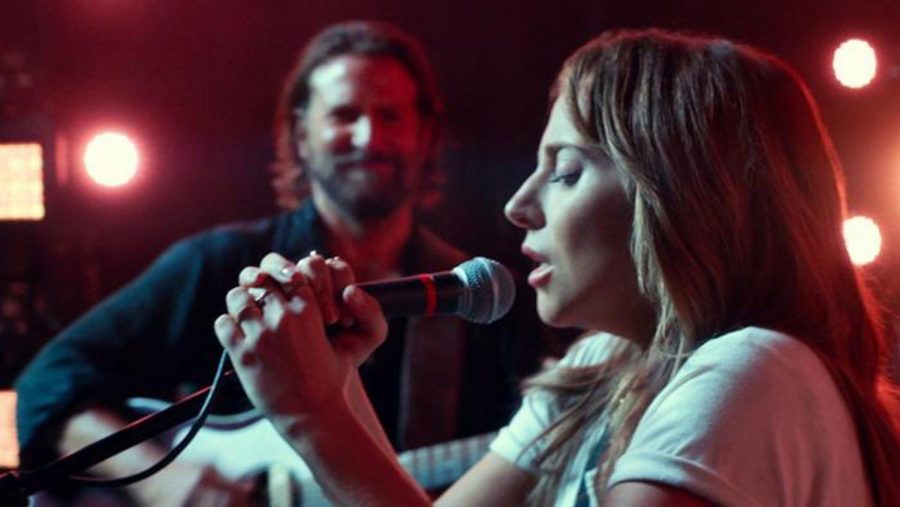What ‘A Star is Born’ says about love, addiction and the insidious power of music
October 18, 2018
Twelve days after opening in the U.S., director Bradley Cooper’s remake of “A Star is Born” already has grossed $100 million. The people, collectively, have spoken, and they love it. (I liked it.) They’re crying on the way into the theaters.
The soundtrack debuted at No. 1 on the Billboard 200 albums chart. That’s the fifth Billboard chart topper for the film’s nominal star, Lady Gaga, and the first for director-co-star Cooper, who also co-wrote the script.
Onscreen, Cooper gets the lion’s share of the pathos while his character, a reckless roots-rock megastar falling prey to pills and booze and demons from his past, goes down, down, down to sweet movie hell. Meantime the big discovery, played by Gaga, hits the heights and shoots the moon and ultimately absolves him of his many sins and weaknesses because their love was true. And he made her what she is.
It’s a weepie with real clout and a sure sense of attack. Every time Hollywood puts out another “Star is Born,” a hit is made. The story weds romantic tragedy to a showbiz fairy tale, and it works every time.
The latest version is also a reminder of the role music plays in the story’s shameless powers of persuasion.
Music-driven romance works its emotional magic while the lights are low, only to leave you with second thoughts after the strains of the last power ballad have faded. It’s possible to fall at least halfway for Cooper’s “Star is Born” and still have problems with how, and why, it tells its story the way it does.
One of the sharpest of the skeptical reviews came from medium.com’s Lindsey Romain, based in Austin, Texas. Her essay took Cooper’s film to task for marginalizing Gaga’s character, Ally, in favor of Cooper’s destructive alcoholic Jackson Maine. “This isn’t a love story,” she wrote. “It’s a horror story about how men feed off of and manipulate women, and how that mistreatment is written off as disease instead of culpability.”
Romain’s not alone, I think, in finding Cooper’s character a dubious martyr figure. “Bradley Cooper,” she writes, “is a recovering alcoholic in real life, and the precision with which he portrays Jackson’s downfall is heart-wrenching. But in his mission to highlight Jackson’s story, Cooper never bothered to give Ally an ounce of agency.”
Romain and I talked by phone about what she wrote. “I had a similar experience with ‘La La Land’ two years ago,” she told me. “Similar story, right? And that movie definitely hoodwinked me while I was watching it. The female protagonist isn’t really developed at all; she’s a pawn in selling the guy’s story, though I do think ‘La La Land’ is a little more even-handed than ‘A Star is Born.’ Which is probably why I liked it more.”
It gets complicated, she said, “when you try to talk about addiction in relation to ‘A Star is Born.’ The movie waves away a lot of borderline-abusive behavior under the guise of, ‘well, he’s an addict.’ I’d be more OK with it if there was a scene where the Lady Gaga character is dealing with it all, and processing her role in his life, and in her own.” Romain acknowledges that Cooper’s film exerts a pull. “It’s almost there for me. But the lack of her voice, and the confusing message about addiction, and what we should allow and accept regarding the addicts in our lives … this is a really unhealthy romance.”
The music in “A Star is Born” papers over most of the objections. This is the glorious, hypnotic legacy of opera, and musical theater, and golden-age Hollywood musicals. Think of the dubious, cliched, even offensive storylines that have been turned into gold by the right melodies, and the most incisive lyrics. It’s a magic trick. Now you’re thinking, and now you’re not, because you’re feeling, not thinking.
Nearly a century ago, “Show Boat” may have been considered racially tolerant, even progressive at the time of its 1927 Broadway premiere. But it sidelines its African-American characters, and forgives its louche, straying white male lead to a somewhat risible degree. And not much of that matters to the audience, because it’s full of gorgeous, brilliant Jerome Kern melodies. One of the best-known carries the title “Make Believe,” which is the whole idea when it comes to investing in a dubious love story.
Many feel a similar emotional connection to more recent pop operas, such as “Miss Saigon” (1989), a touring revival of which arrives in Chicago next month. The “Madame Butterfly” adaptation features a score by Claude-Michel Schoenberg and Alain Boublil, with lyrics by Boublil and Richard Maltby Jr., and updates Puccini’s romantic tragedy to the Vietnam War. I hate that show; it has always struck me as pushy, desperate and vastly inferior to the same team’s “Les Miserables.” Yet its critical and civilian admirers are many, and you can’t tell them the music’s no good. To their ears, it’s Puccini all over again, and that’s why they buy the show’s patronizing racial and sexual politics.
To the new “Star is Born’s” considerable credit, the movie is persuasive in its performance sequences, and frequently, crudely powerful in the dramatic encounters. The key early scene arrives when, midconcert, Cooper’s character duets with the up-and-comer and, in a few minutes’ time, a star is born before our eyes.
“That scene’s so good,” Romain says, laughing. “And everything leading up to it is so good, the movie can only go downhill from there.” It’s the same thing I heard from so many friends and readers regarding “La La Land,” except they were talking about the alternate-universe dream ballet at the end, not the star-is-born number at the beginning.
If they’re at all attuned to songs such as “Shallow” or “I’ll Never Love Again” in “A Star is Born,” audiences won’t think twice or even once about what the massive hit of the moment is saying about anything. Noel Coward put it best, in his play “Private Lives”: “Extraordinary how potent cheap music is.” In an earlier Coward play, “Hay Fever,” Judith speaks to the hoodwinking, bamboozling effect of the right melody heard in the right circumstances.
“Are you susceptible to music?” she asks Richard, who replies: “I’m afraid I don’t know very much about it.”
Ah, she says. “You probably are, then.”








